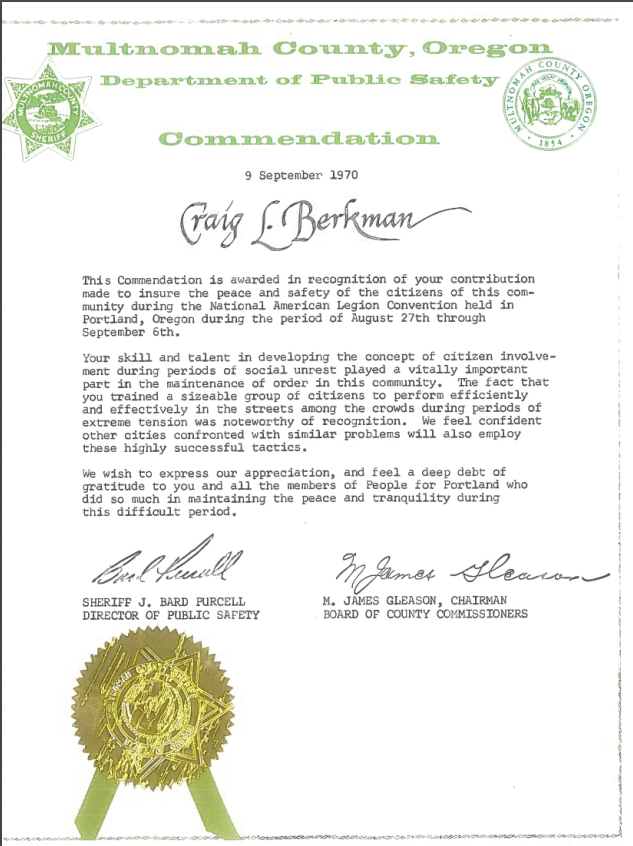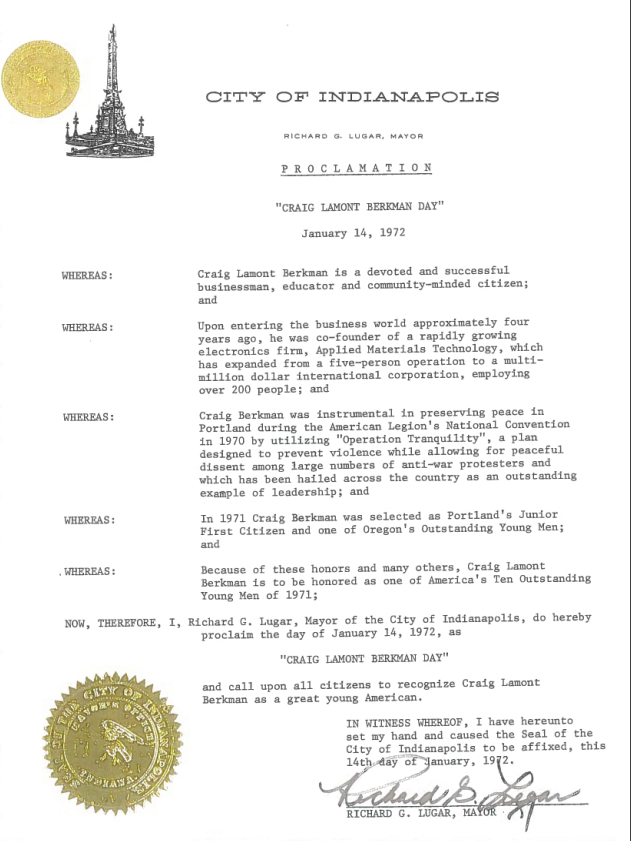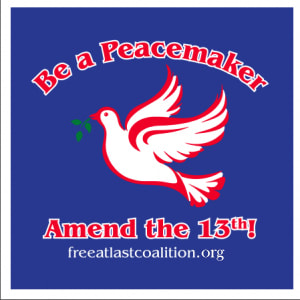People for Portland
Operation Tranquility, Summer 1970
Few contemporary problems have troubled the American people more than violence in the streets. The events in Watts, Berkeley, Detroit, Chicago and Kent State are easily recalled by most of us. Frequently, public officials have responded with force after extensive damage to persons and property has occurred. The aftermath usually finds communities polarized with those stressing law and order criticized by those who believe that order without protection of civil liberties cannot be condoned.
When federal, state and city officials learned in June of 1970 that the anti Vietnam War movement was coming to Portland, Oregon to confront Legionnaires during their September, 1970 National American Legion Convention they feared a major crisis. The U.S. Department of Justice warned that Portland had the highest risk of violence of any city in America during the fall of 1970.
The leadership of Craig Berkman during this time of pending violence, illustrates Craig’s unique contribution to protecting free speech and free assembly while preserving law and order. Accompanied by a former Oregon State Senator, Phil Hitchcock a good friend of Governor Tom McCall, during the summer of 1970 Craig met with Governor McCall and two of his key assistants, Ed Westerdahl, his Executive Assistant and Ron Schmidt, his Press Secretary. During this meeting, Craig provided copies of a position paper and a recommended implementation plan that he had written prior to communicating with the Governor and his staff. Craig urged Governor McCall and other government officials and citizen volunteers to organize and financially and logistically support a sleeping and entertainment venue for the thousands of expected protestors outside of Portland’s city limits. He also encouraged the Governor, the Oregon National Guard and other law enforcement agencies to camouflage their presence during the convention week in order to avoid giving people the impression that Portland was an armed city unwilling to ensure free speech and peaceful assembly.
Shortly thereafter a small group representing the “Peoples Army Jamboree” meet with Governor McCall and his key aides. After that meeting and with Governor McCall’s approval, planning began for an alternative event to be held at McIver State Park. Vortex I embodied the sleeping, entertainment and food venue elements that Craig had previously recommended. While this effort was underway, Craig worked with Governor McCall, Portland’s Mayor Terry Shrunk, local, state, and federal law enforcement officials in organizing and implementing a plan “Operation Tranquility” that was designed to prevent violence and to ensure peaceful dissent. A central component of the plan was the deployment of citizen volunteers among anti- war protesters during their marches and throughout the crowds lining the streets during the American Legion parade.
To achieve this objective Craig, and a former Oregon State Legislator, Mike Ragsdale, organized a volunteer citizens group called “People for Portland”, that recruited over 1200 men and women from dozens of civic and faith based entities. At the beginning and end of People for Portland, volunteers were involved in projects that included a rumor control center, citizen involvement training sessions in crowd control psychology, television panels, and a speakers bureau all focused on a strategy to keep things “cool”. Throughout the convention week, the People for Portland defused altercations before lawbreakers could use them as an excuse to ignite a fuse of planned violence. During a week in which thousands of anti-Vietnam protesters and Legionnaires made their views known on the issue of war and peace, there were no trashed or burned buildings, no bloodshed nor martyrs to fan revolutionary fires. Damage was limited to one broken window. Listen to and watch a video history of ” Governor McCall’s televised address on Operation Tranquility and Vortex I” please go to the following coordinates on You Tube:
Few contemporary problems have troubled the American people more than violence in the streets. The events in Watts, Berkeley, Detroit, Chicago and Kent State are easily recalled by most of us. Frequently, public officials have responded with force after extensive damage to persons and property has occurred. The aftermath usually finds communities polarized with those stressing law and order criticized by those who believe that order without protection of civil liberties cannot be condoned.
When federal, state and city officials learned in June of 1970 that the anti Vietnam War movement was coming to Portland, Oregon to confront Legionnaires during their September, 1970 National American Legion Convention they feared a major crisis. The U.S. Department of Justice warned that Portland had the highest risk of violence of any city in America during the fall of 1970.
The leadership of Craig Berkman during this time of pending violence, illustrates Craig’s unique contribution to protecting free speech and free assembly while preserving law and order. Accompanied by a former Oregon State Senator, Phil Hitchcock a good friend of Governor Tom McCall, during the summer of 1970 Craig met with Governor McCall and two of his key assistants, Ed Westerdahl, his Executive Assistant and Ron Schmidt, his Press Secretary. During this meeting, Craig provided copies of a position paper and a recommended implementation plan that he had written prior to communicating with the Governor and his staff. Craig urged Governor McCall and other government officials and citizen volunteers to organize and financially and logistically support a sleeping and entertainment venue for the thousands of expected protestors outside of Portland’s city limits. He also encouraged the Governor, the Oregon National Guard and other law enforcement agencies to camouflage their presence during the convention week in order to avoid giving people the impression that Portland was an armed city unwilling to ensure free speech and peaceful assembly.
Shortly thereafter a small group representing the “Peoples Army Jamboree” meet with Governor McCall and his key aides. After that meeting and with Governor McCall’s approval, planning began for an alternative event to be held at McIver State Park. Vortex I embodied the sleeping, entertainment and food venue elements that Craig had previously recommended. While this effort was underway, Craig worked with Governor McCall, Portland’s Mayor Terry Shrunk, local, state, and federal law enforcement officials in organizing and implementing a plan “Operation Tranquility” that was designed to prevent violence and to ensure peaceful dissent. A central component of the plan was the deployment of citizen volunteers among anti- war protesters during their marches and throughout the crowds lining the streets during the American Legion parade.
To achieve this objective Craig, and a former Oregon State Legislator, Mike Ragsdale, organized a volunteer citizens group called “People for Portland”, that recruited over 1200 men and women from dozens of civic and faith based entities. At the beginning and end of People for Portland, volunteers were involved in projects that included a rumor control center, citizen involvement training sessions in crowd control psychology, television panels, and a speakers bureau all focused on a strategy to keep things “cool”. Throughout the convention week, the People for Portland defused altercations before lawbreakers could use them as an excuse to ignite a fuse of planned violence. During a week in which thousands of anti-Vietnam protesters and Legionnaires made their views known on the issue of war and peace, there were no trashed or burned buildings, no bloodshed nor martyrs to fan revolutionary fires. Damage was limited to one broken window. Listen to and watch a video history of ” Governor McCall’s televised address on Operation Tranquility and Vortex I” please go to the following coordinates on You Tube:
|
|
|
Few volunteer projects have received so much national publicity. Numerous inquiries came from public officials throughout America who were interested in learning how Portland and the State of Oregon preserved civil rights without any violence.
The appreciation of Craig’s vision and leadership was publicly acknowledged by Governor Tom McCall. “Most citizens are content to call on government to solve their problems. You displayed a higher recognition of the obligation of citizenship by leading others who gave themselves, frequently under circumstances of personal risk, to maintain tranquility. Without your efforts, the story of the American Legion Convention would have had a different ending”.
Members of the press and public officials assessment of Craig’s efforts include the following comments:
Nicholas von Hoffman, Washington Post, September 1970. “Chicago seemed to be repeating itself. There were the same arguments over parade permits and permission to use the parks to sleep in. The critical difference was a group of citizens who interposed themselves to work out a way of securing both public order and free expression”
The Christian Science Monitor, September 1970. “People for Portland monitors kept things so cool, that there was no need to use the National Guard”.
Portland Mayor Terry D. Shrunk, September 1970. “Craig, your suggestions and advice were the significant factor in keeping Portland peaceful during a potentially explosive week. Thanks for a tremendous job”
Liberty Magazine, August 1971. “Craig Berkman’s leadership inspired hundreds of churchman to practice the Judea-Christian ethic during times of extreme stress. He is an example of how men can make their faith relevant in meeting the problems of our time”
Members of the press and public officials assessment of Craig’s efforts include the following comments:
Nicholas von Hoffman, Washington Post, September 1970. “Chicago seemed to be repeating itself. There were the same arguments over parade permits and permission to use the parks to sleep in. The critical difference was a group of citizens who interposed themselves to work out a way of securing both public order and free expression”
The Christian Science Monitor, September 1970. “People for Portland monitors kept things so cool, that there was no need to use the National Guard”.
Portland Mayor Terry D. Shrunk, September 1970. “Craig, your suggestions and advice were the significant factor in keeping Portland peaceful during a potentially explosive week. Thanks for a tremendous job”
Liberty Magazine, August 1971. “Craig Berkman’s leadership inspired hundreds of churchman to practice the Judea-Christian ethic during times of extreme stress. He is an example of how men can make their faith relevant in meeting the problems of our time”


